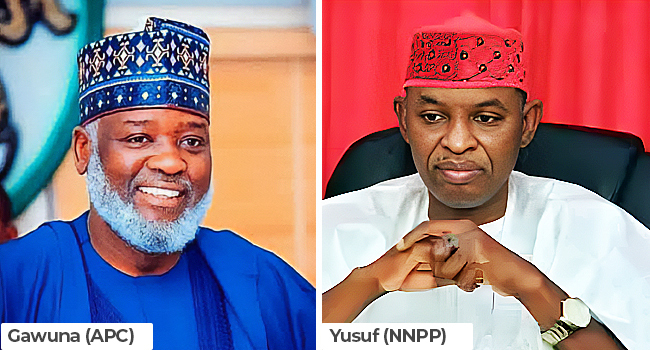INEC’s lawyer cites Supreme Court cases in defending Kano governor’s election victory
The Supreme Court has reserved judgement in the appeal filed by the Kano State Governor, Abba Yusuf, challenging the verdict of the Court of Appeal and the State Election Petitions Tribunal, which removed him from office.
The five-member panel, led by Justice John Okoro, reserved the judgement after parties adopted their brief of arguments.
At the today’s proceedings of the hearing of the Kano Governorship Appeal, Justice Okoro urged counsels involved in the matter to meet and agree on which of the nine appeals and cross appeals that should be heard, with the outcome binding on the remaining eight.
A consensus was reached by all the parties to make the main appeal which shall be heard by the apex court, with cross appeals such as that questioning the membership of Abba Yusuf abiding with the outcome.
Counsel for the Independent National Electoral Commission (INEC), Abubakar Mahmoud, began by stating that the key witness whose testimony was the ground for deducting the 165,616 votes of Yusuf deemed unlawful were subpoened to give evidence.
READ ALSO
Abia plans special welfare package to mitigate exodus of health workers
He said that his testimony was inadmissible for not being front loaded along with the main petition at the Tribunal and as such his testimony and exhibits tendered are therefore incompetent.
INEC’s counsel informed the court that the said contested 165,616 ballot papers were authentic and originated from INEC and not elsewhere. He said it is not the duty of a voter, on the day of election, to check if a ballot paper is signed or stamped and without date of election, adding that’s the task of a party agent.
Mahmoud further informed the court that the recounting of votes was done privately at the tribunal chambers after the deduction of the contested 165,616 votes.
He added that even when they were brought to the Court of Appeal they weren’t demonstrated.
INEC’s counsel further told the apex court panel that only a portion of the unlawful ballots were examined at the tribunal.
Mahmoud clarified that he is not taking sides except with respect to the correct interpretation of the law.
On Yusuf’s membership of the NNPP, he stated that is an internal affair of the political party concerned and not for an external body, citing previous decisions of the apex court.
He added that it is not a constitutional matter as being claimed by the All Progressives Congress (APC) which relied on Section 177(c) of the Constitution, as amended, and Section 77 of the Electoral Act.
Mahmoud faulted the practice of political parties which seek to use the Court as an “arena” to get victory after the voters had decided.
He informed the apex court that the New Nigeria Peoples Party (NNPP) submitted the name of Abba Yusuf as its candidate for the governorship election, and that if the APC had anything against Yusuf’s candidacy, it should have done so after INEC published the names of candidates.
Counsel to Governor Yusuf, Wole Olanipekun, faulted the nullification of his electoral victory on grounds of the INEC presiding officer failing to sign or stamp the ballot papers.
Wole Olanipekun argued that has nothing to do with the Electoral Act, insisting it is on INEC’s guidelines and as such not sufficient grounds to deem the votes unlawful, warranting nullification.
Olanipekun further told the court that based on the evidence given by an expert witness during the Tribunal stage of the matter, only about 1,800 ballots were not signed or stamped, and that those are insignificant figures and as such insufficient to void the election.
On the membership of Yusuf, Olanipekun stressed that it is the internal affair of the party concerned, with the courts therefore lacking jurisdiction to decide on the choice of a political party’s candidate. He therefore prayed the court to upturn the decision of the Appeal Court which affirmed the decision of the tribunal sacking the governor.
Counsel for APC, Akin Olujimi, insisted that Section 177(c) of the Constitution is a key determiner of the Kano matter, and that the matter being a constitutional issue gives it jurisdiction to decide on it.
On November 13, the Court of Appeal upheld the verdict of the tribunal. In its ruling, the Appeal Court agreed with the judgement of the tribunal, ruling that the fielding of Abba Yusuf was in breach of the Electoral Law as he was not qualified to contest that election.
In September, the tribunal nullified the victory of Yusuf, the candidate of the New Nigerian Peoples Party (NNPP), in the March 18 governorship election.
The tribunal also affirmed Nasiru Gawuna of the All Progressives Congress (APC) as the duly elected governor of Kano.














